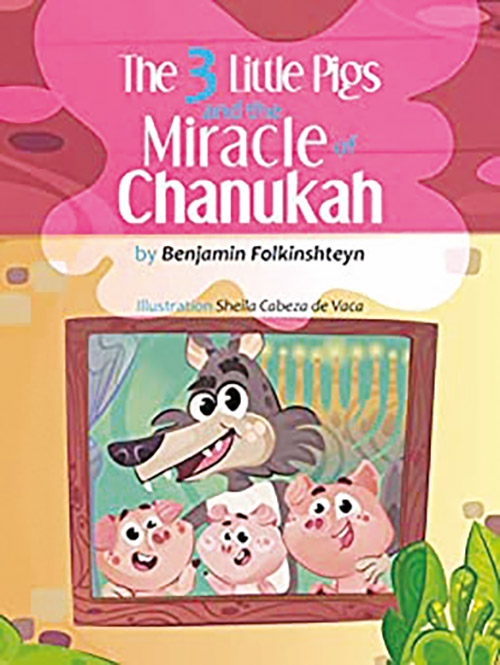
Highlighting: “The 3 Little Pigs and the Miracle of Chanukah” by Binyamin Folkinshteyn. Independently published. 2021. Paperback. 32 pages. ISBN-13: 979-8776158131.
Six years in the making, a holiday-themed retelling of “The Three Little Pigs” arrived this week in time for the Festival of Lights. Stamford resident Benjamin Folkinshteyn is the author behind “The 3 Little Pigs and the Miracle of Chanukah,” but not the first Jewish writer to engage the porcine trio as they navigate the clear and present danger of a predator knocking at their doors.
A classic English folktale, the earliest published version of the story followed a fox and a group of pixies living in the Dartmoor region of Devon, England, and appeared in the 1853 book “English Forests and Forest Trees: Historical, Legendary, and Descriptive.” As “The Three Little Pigs” (local dialect may have transformed “pixies” into “pigsies”), the story was first published in “The Nursery Rhymes of England,” an 1886 anthology edited by James Halliwell-Phillipps.
But it was an Australian Jew, Joseph Jacobs, who published the version of the fable best recognized today, in the 1890 collection “English Fairy Tales,” which credits Halliwell-Phillipps’ earlier work. In addition to being hailed as a foremost expert on English folklore, Jacobs is renowned for popularizing many folktales from cultures throughout the world, including Jewish, Indian, and Celtic, among others.
Since then, “The Three Little Pigs” has enjoyed several different plot versions, cartoons (including a World War II-era short portraying Hitler as the wolf) and animated feature films, as well as cameos in musical and literary works.
Fast-forward to 2012, when the classic trio reappeared in the kick-butt fractured fairy tale “The Three Ninja Pigs,” by Corey Rosen Schwartz and illustrator Dan Sattat.
That’s the book that inspired Folkinshteyn when he entered a New York City bookstore a few years ago. Browsing through titles for his toddler son, “something clicked,” he recalled. “There are so many retellings of ‘The Three Little Pigs,’ but I had never seen a version told from a Jewish perspective or from the wolf’s perspective.”
An attorney by profession, Folkinshteyn has a lot of experience writing nonfiction, and decided to try his hand at creating a book for kids.
A native of Moscow, Folkinshteyn immigrated to Philadelphia with his family in 1994 when he was 13. After earning his undergraduate and law degrees from the University of Pennsylvania, he moved to New York City. In August 2017, he and his wife, Jennie Woltz, relocated to Stamford’s Revonah neighborhood, where they live with their 8-year-old son and 6-year-old daughter. Both are attorneys and own the Stamford-based firm Woltz & Folkinshteyn, P.C.
In “The 3 Little Pigs and the Miracle of Chanukah,” the rhyming narrator is the wolf, a conscientious (and Yiddish-quipping) firefighter from the Zev family who tries to keep his swine neighbors safe during their Chanukah celebrations, fretting over the dangers of candle-lighting and latke-frying in houses made of straw and sticks. His efforts are misinterpreted by the pigs, leading to a couple of mishaps born of the holiday revelry.
Unlike the original fairytale or “The Three Ninja Pigs,” Folkinshteyn’s story is not a violent one and features a happy ending. “Only latkes and sufganiyot get eaten, the protagonists reach an understanding between the species and realize each other’s shortcomings, and there are lessons learned at the end,” the author revealed.
As he wove his tale, Folkinshteyn debated whether to send the manuscript to publishing houses, including PJ Library. “But they get so many submissions and so few get selected,” he said. In the end, what moved the work off his computer and onto a printing press was the decision to self-publish. “This is something I was doing for fun; I enjoy the story and wanted others to be able to read it.”
Folkinshteyn chose Publicaciones La Caja in Mexico City for its track record with Jewish manuscripts. He worked with illustrator Sheila Cabeza de Vaca.
As for the story, “there’s something funny about anthropomorphic pigs celebrating Chanukah,” said the author, who found it most challenging to move his narrative through the eight days of the holiday while staying true to the three critical junctures of the original folktale that lend excitement to the plot.
Folkinshteyn hopes to see his book translated into other languages or even become a Chanukah favorite. He may consider applying the Jewish lens to other beloved classic tales. “But I don’t want it to suffer the fate of many sequels, like ‘Back to the Future Part III’,” he said. “I want the story to be authentic.”
The book is available on Amazon at https://www.amazon.com/dp/B09MRD5981/ref=sr_1_1?keywords=folkinshteyn&qid=1638238677&sr=8-1.
By Cynthia Mindell













